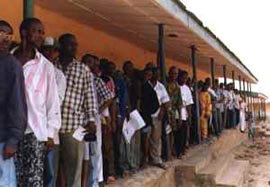 Moving towards a better tomorow Moving towards a better tomorow
It is no delusion that Nigeria is Africa's biggest market. The country is the most populous African nation in the world (one fifth of the entire African population). It boasts a population of over 100 million people, largely skillful and traditionally strong-willed, tens of thousands of whom are spread into several countries of the world, toiling to improve their lives' worth and in the process acquiring the broad outlook essential to unlocking a developing country like Nigeria from the vicissitudes of backwardness.

Nigeria's population is a mix of over 250 tribes, and the country's former three regions of the north, the East, and the West are a merger of abundant human and mineral resources. Chief among which are the East's palm oil and rubber, the North's popular groundnut pyramid, hides and skin, and the West's cocoa, until today, Nigeria's second largest export earner. The country has a land area covering about 923,768.64 square kilometers and it started off as a purely agrarian society with about 70 per cent of the population engaged in the sector. At independence in 1960, Nigeria's agricultural export earning was about 70 percent.
|
Three years (1957) earlier, Shell had discovered Nigeria's first important oil deposit, production of which commenced a year after. So, in 1960, the problem the new government of Alhaji Tafawa Balewa (Nigeria's Prime Minister and first indigenous ruler) had was not how to manage sovereignty, but prosperity.
Nigeria's main export product is however oil. It has a proven daily production of 2 million barrels, a reserve of over 23 billion barrels, as well as above 160 trillion cubic meters of gas. But oil, Nigeria's main source of foreign exchange, is also its main source of worry. The billions of dollars that come with oil exploration has attracted the military and, oil rather than be a blessing, is being seen by many Nigerians as a curse. The military's 30 years rule out of the country's 39 years of independence has not only failed to translate the oil fortune to prosperity but has even turned what was supposed to be wealth to waste. In Nigeria, corruption has become second nature and it is the very character of Nigeria's daily existence. The victims of all these, however, are the Nigerian masses who have continued to wallow in poverty in the midst of plenty.
The immediate past military ruler, General Abdulsalami Abubakar in an interview early this year says things are changing for the better. "Nigeria has very bright future indeed, with the abundant human and mineral resources with which we have been endowed. The difficulties we have gone through as a nation have changed our outlook from people who bother only about themselves and their localities to a nation desirous of living together in one indivisible country", he says. |

